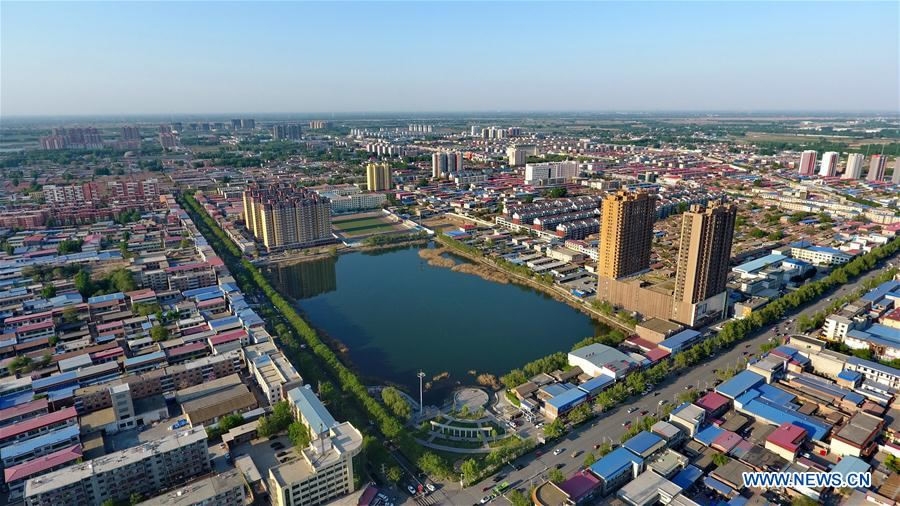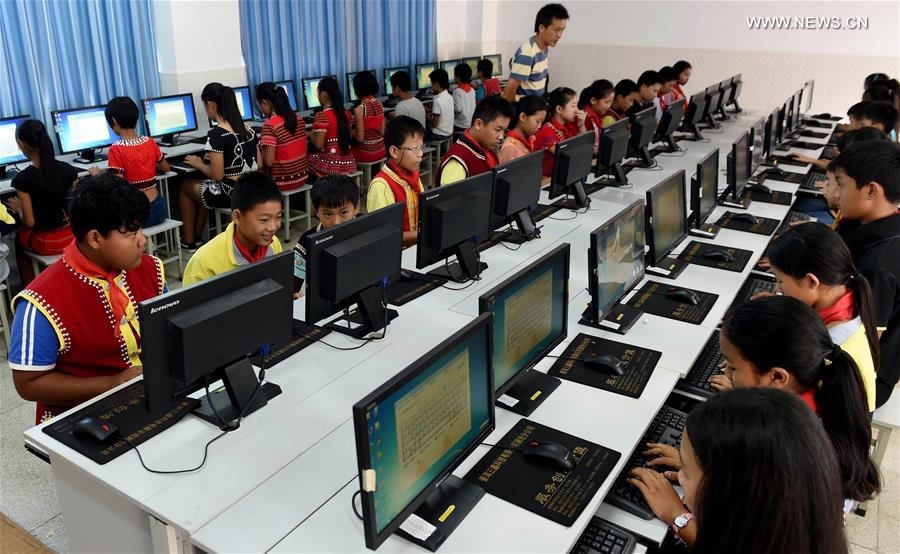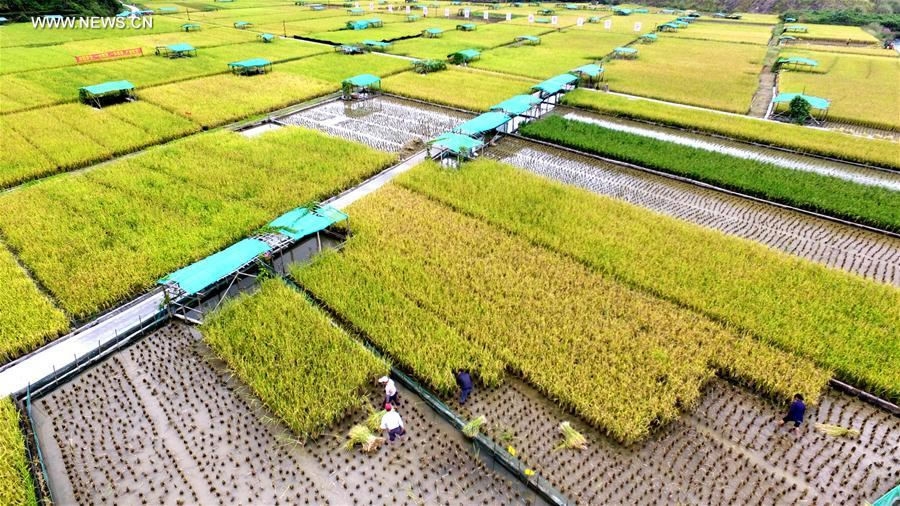A new era does not start overnight. When it comes to one of the nation’s most fundamental interests - people’s livelihood and welfare - Xi Jinping and his team have been hard at work on a daily basis for the past 5 years (or even longer.) Hence, the 19th CPC National Congress is just a “comma,” or a “milestone” opportunity to summarize the two key concepts of its mission: “People” and “new era”.
The “people’s new era” means a continuing people-oriented strategy and the journey to the nation’s rejuvenation. This is not only the foundation of the report, delivered by Xi Jinping on the opening day of the 19th CPC National Congress, but also a day-to-day working guideline for all the party members.

File photo taken on April 21, 2017 shows the scenery of the county seat of Xiongxian, north China's Hebei Province. Beijing witnesses a great change in the past five years and the city will keep focusing on the coordinated development in Beijing, Tianjin and Hebei regions and objective of removing non-capital functions. /Xinhua Photo
File photo taken on April 21, 2017 shows the scenery of the county seat of Xiongxian, north China's Hebei Province. Beijing witnesses a great change in the past five years and the city will keep focusing on the coordinated development in Beijing, Tianjin and Hebei regions and objective of removing non-capital functions. /Xinhua Photo
The “people’s new era” also means optimizing and upgrading people’s livelihood. The ongoing congress first reaffirmed the nation's target to eliminate poverty by 2020 and to achieve its goal of becoming a “moderately prosperous society.” Since the 18th CPC National Congress, China has successfully helped to lift 55 million people out of poverty. But as of today, China still has about 40 million impoverished people, or 3 percent of the population, living in rural areas. For them, food in the belly and a roof over their heads is of vital importance.
Secondly, the gap in personal wealth and education levels between people living in cities and people in rural areas is growing and will continue to grow, if not addressed and tackled. For example, the average income in Guizhou Province, where Xi Jinping was elected as the 19th CPC delegate, was 15,121 RMB yuan in 2016, less than a third of that in Beijing or Shanghai. For the former, their everyday concern is mostly basic needs, for the latter, a standard livelihood package includes more: Education, medical care, food safety, culture and sports options and so on, so naturally the day-to-day anxiety lies with a better school, a better hospital, a better job and a better holiday destination.

Photo taken on September 22, 2016 shows pupils having computer class in Ximeng Wa Autonomous County of Pu'er, southwest China's Yunnan Province. Pu'er, a city in southwest Yunnan, has been endeavoring to reduce its poverty-stricken population in recent years. In total 527,000 people have overcome poverty in the past five years. By August of 2017, the impoverished in Pu'er has been reduced to 358,000. /Xinhua Photo
Photo taken on September 22, 2016 shows pupils having computer class in Ximeng Wa Autonomous County of Pu'er, southwest China's Yunnan Province. Pu'er, a city in southwest Yunnan, has been endeavoring to reduce its poverty-stricken population in recent years. In total 527,000 people have overcome poverty in the past five years. By August of 2017, the impoverished in Pu'er has been reduced to 358,000. /Xinhua Photo
"The needs to be met for the people to live a better life are increasingly broad. Not only have their material and cultural needs grown; their demands for democracy, rule of law, fairness and justice, security, and a better environment are increasing," Xi said, expanding the needs in his report.
Which means “the principal contradiction facing Chinese society in the new era, is that between unbalanced and inadequate development and the people's ever-growing needs for a better life” Xi went on to say. The CPC must therefore stay true to its original aspiration, continue with commitment to and practices of the people-centered philosophy of development, and work to promote well-rounded human development and common prosperity for everyone in this people’s new era.
Practices are worth sharing. Take Beijing, the capital of China and also the place where Xi grew up, as an example. A “social work cross platform office” was established 10 years ago under the guidance and support of the CPC Beijing Committee, the first of this kind in China. The office, over years of effort, classified people’s needs into three levels: basic needs, convenience needs, and upgraded needs.
To meet the basic needs of people, they coordinated with various government departments by building or re-functioning over 3,000 permanent social work hubs to ensure the basic needs are efficiently met. Then the office broadened the services in order to cover more areas than just ‘hukou’ (residency)-related services such as education coordination, health care resources allocation, etc. by mobilizing the various NGOs in Beijing and facilitating the latter’s work with the necessary funds.
To further meet the needs of people in Beijing, the office then encouraged social business entities to jointly establish a “15-mins service circle” to ensure the residents enjoyed an upgraded life: From a mobile convenience ‘store’ for daily fresh vegetable purchase, to an upgraded community medical care service, and recreational centers for elders. Furthermore the office is now developing new policies to ensure children from poor families receive subsidized college education, and is helping young graduates find jobs and start businesses by applying Internet Plus information sharing technologies.

Farmers harvest ratooning rice in the field at Dashu Village of Sanjiang Dong Autonomous County, south China's Guangxi Zhuang Autonomous Region, on October 20, 2017. /Xinhua Photo
Farmers harvest ratooning rice in the field at Dashu Village of Sanjiang Dong Autonomous County, south China's Guangxi Zhuang Autonomous Region, on October 20, 2017. /Xinhua Photo
This is just an example of one on-going effort by one local CPC committee and government, but it shows the tradition of continuity in CPC’s people-oriented strategies and best practice sharing philosophy across regions and sectors. It is certainly expected to remain that way for some time to come, perhaps until the principal contradiction shifts again.
Last but not least, the identifying of new principal contradictions, as well as the new era for Chinese people, is a clear statement and evolution of human rights in China: A roof over the head, food in the belly, literacy for everyone, reasonable health care conditions, a bright future for children, taking care of the old, and certainly more freedom and stronger sense of benefits from the above achievements.
(Han Hua, fellow at Chong Yang Institute for Financial Studies of Renmin University. The article reflects the author's opinion, not necessarily the view of CGTN.)





